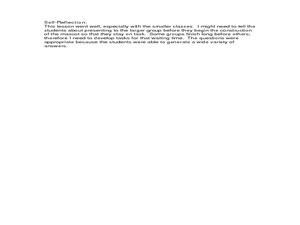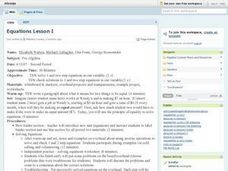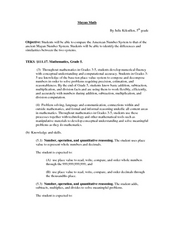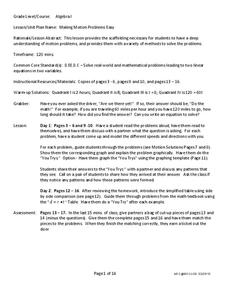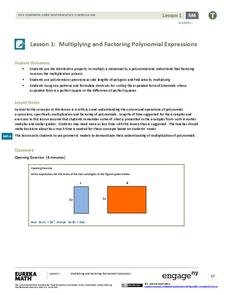Curated OER
Algebraic Fractions
In this algebra worksheet, students factor the numerator and denominator of 20 complex fraction to determine common terms. The first six problems require students to simplify. The final 14 problems require either multiplication or...
Curated OER
Make a Math Mascot
Create a math mascot by identifying irrational and rational numbers. Learners will also solve linear equations.
Curated OER
Arts Impact and Math
Third graders incorporate math into dancing. In this algebra instructional activity, 3rd graders identify different shapes and patterns using dance movements. They relate the different creations to polygons as they incorporate the use of...
Curated OER
Equations Lesson 1
Middle schoolers engage in a study of equations and how they are solved using algebraic methods. This overrides the fact of guessing as done in earlier grades. They cover the concept of inverse operations as the main way to manipulate...
Curated OER
College Prep Algebra, GCF and Factor By Grouping
In this algebra worksheet, pupils factor out common terms from 20 polynomials. On several they will group two pairs of terms and factor to find the common elements.
Curated OER
Discovering Math Concepts in Business Mathematics, Economics, and Finance
Explore the concept of money and research its origin. There are many concepts related to business math, thusly, there are many formulas used to make calculations around money. Exchange rates of money in different countries, interest,...
Curated OER
Semester Review Worksheet: College Prep Algebra
In this semester review worksheet, students simplify given expressions. They translate word sentences into algebraic expressions, solve equations through substitution, and find the value of a variable in a given equation. This worksheet...
Curated OER
College Prep Algebra, Factoring Trinomials
In this algebra worksheet, pupils factor trinomials into the multiplication of two binomials. All trinomials are in the form 1x^2 +/- bx +/- c.
Curated OER
Math Mediator Lesson 10: Slope
Students explore the concept of slope. In this Algebra I instructional activity, students investigate the definition of slope as rise over run or change in y compared to change in x. The instructional activity includes a real-world...
Curated OER
Mayan Math
Fifth graders investigate the Maya's as mathematicians. In this Mayan math lessons, 5th graders work with the ancient Mayan numbering system by comparing it to the American Number System. They tell the differences and similarities...
Illustrative Mathematics
Fishing Adventures 1
Often inequalities exist in many real-world contexts but young math learners struggle with understanding how to represent that relationship in a simple equation using an inequality. This activity focuses on the basic concepts by using...
Illustrative Mathematics
Foxes and Rabbits 1
Here is where algebra learners begin to understand that a function is a rule, and for each input there is exactly one output. The commentary gets bogged down with information about the predator-prey relationship between the fox and...
EngageNY
Solution Sets of Two or More Equations (or Inequalities) Joined by “And” or “Or”
English and math have more in common than you think. Make a connection between a compound sentence and a compound inequality with an activity that teaches learners the difference between an "and" and "or" inequality through solutions...
EngageNY
Systems of Equations
What do you get when you cross a circle and a line? One, two, or maybe no solutions! Teach learners to find solutions of quadratic and linear systems. Connect the visual representation of the graph to the abstract algebraic methods.
EngageNY
Interpreting Correlation
Is 0.56 stronger than -0.78? Interpret the correlation coefficient as the strength and direction of a linear relationship between two variables. An algebra lesson introduces the correlation coefficient by estimating and then calculating it.
EngageNY
Exploring the Symmetry in Graphs of Quadratic Functions
Math is all about finding solutions and connections you didn't expect! Young mathematicians often first discover nonlinear patterns when graphing quadratic functions. The lesson begins with the vocabulary of a quadratic graph and uses...
West Contra Costa Unified School District
Motion Problems
Let's hope class participants don't get motion sickness. In the instructional activity, class members first solve motion problems using tables and graphs. They then use algebraic techniques to solve motion problems.
West Contra Costa Unified School District
Linear-Quadratic Systems
Why do I have to learn two different ways to solve linear-quadratic systems? Isn't one way enough? Learners first investigate the three possible situations for linear-quadratic systems (two, one, or zero solutions), then solve such...
EngageNY
Part of a Whole as a Percent
Pupils use visual models, numeric methods, and equations to solve percent problems. To complete the second installment of 20, they find the part given the percent and the whole, find the percent given the part and the whole, and find the...
Virginia Department of Education
Linear Modeling
An inquiry-based algebra lesson plan explores real-world applications of linear functions. Scholars investigate four different situations that can be modeled by linear functions, identifying the rate of change, as well as the strength...
Mathematics Assessment Project
Solving Linear Equations in One Variable
A thorough and professional appearance characterizes a lesson on linear equations. Maturing mathematicians are taught to identify and exemplify linear equations with a single variable. They also classify equations according to the number...
Curated OER
Adding and Subtracting Polynomials Using Algebra Tiles
Students add and subtract polynomials. In this algebra lesson, students use algebra tiles to perform operation of polynomials. They model their problems and understand how to combine like terms using tiles.
EngageNY
Normal Distributions (part 1)
Don't allow your pupils to become outliers! As learners examine normal distributions by calculating z-scores, they compare outcomes by analyzing the z-scores for each.
EngageNY
Multiplying and Factoring Polynomial Expressions (part 1)
Polynomial multiplication and factoring go hand in hand. Why not teach them together. This resource begins with an area model for distributing a monomial and then connects the process to factoring the GCF. Learners then advance to...



